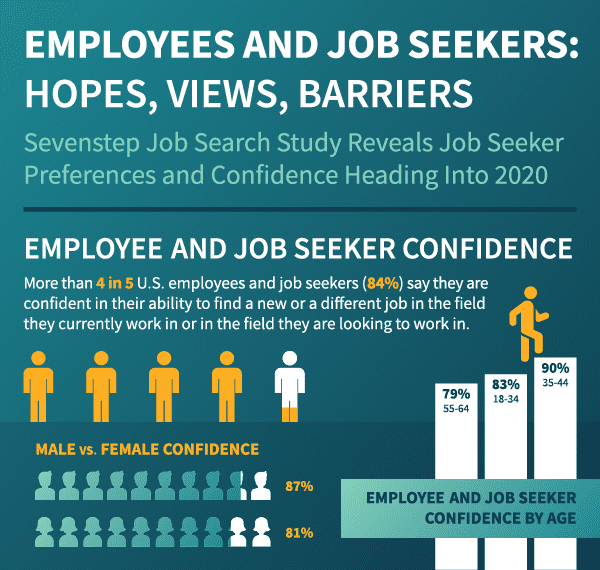Sevenstep Team | January 27, 2020
In a recent study commissioned by Sevenstep and conducted online by The
Harris Poll, more than 4 in 5 U.S. employees and job seekers (84%) say they are
confident in their ability to find a new or a different job in the field they
currently work in or in the field they are looking to work in.
The aim in conducting the Job Search Study was to better understand
perspectives of employees and job seekers when seeking new employment, what
barriers impact their job search, as well as what features attract them to new
employment opportunities and employers.
For instance, when asked, “How confident are you in your ability to
find a new/different job in the field you currently/are looking to work in?”
Male employees and job seekers reported feeling more confident than female
employees and job seekers.

For the complete survey findings, download a copy of the Sevenstep Job Search Study infographic: Employees and Job Seekers: Hopes, Views, Barriers.
Full Methodology
This survey was conducted online within the United States by The Harris Poll on behalf of Sevenstep between November 5-7, 2019 among 2,050 adults ages 18+, among whom 1,322 are currently employed or not employed but looking for work.
Results were weighted for age within gender, region, race/ethnicity,
income, and education where necessary to align them with their actual
proportions in the population.
Propensity score weighting was also used to adjust for respondents’
propensity to be online.
All sample surveys and polls, whether or not they use probability
sampling, are subject to multiple sources of error which are most often not
possible to quantify or estimate, including sampling error, coverage error,
error associated with nonresponse, error associated with question wording and
response options, and post-survey weighting and adjustments. Therefore, Harris
Poll avoids the words “margin of error” as they are misleading. All that can be
calculated are different possible sampling errors with different probabilities
for pure, unweighted, random samples with 100% response rates. These are only
theoretical because no published polls come close to this ideal.
Respondents for this survey were selected from among those who have
agreed to participate in online surveys. The data have been weighted to reflect
the composition of the adult population. Because the sample is based on those
who agreed to participate in our panel, no estimates of theoretical sampling
error can be calculated.
About The Harris Poll
The Harris Poll is one of the longest running surveys in the U.S.
tracking public opinion, motivations and social sentiment since 1963 that is
now part of Harris Insights & Analytics, a global consulting and market
research firm that delivers social intelligence for transformational times. We
work with clients in three primary areas; building twenty-first-century
corporate reputation, crafting brand strategy and performance tracking, and
earning organic media through public relations research. Our mission is to
provide insights and advisory to help leaders make the best decisions possible.
To learn more, please visit www.theharrispoll.com.


